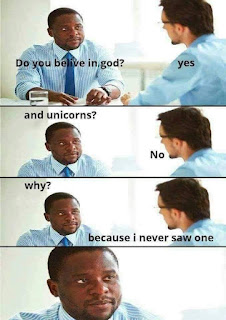IntroductionIt is 11:30 on a Saturday night as I am writing this. When I saw the objection that I will present below, I had no plans to respond to it immediately. However, since it is late and I am...
Introduction
It is 11:30 on a Saturday night as I am writing this. When I saw the objection that I will present below, I had no plans to respond to it immediately. However, since it is late and I am unable to sleep, I thought I would take the time to respond to this before I go to bed. I first saw this objection in a Facebook group that I am part of. No doubt, it showed up in this particular group because someone saw the same flaws in it that I did. I would not be surprised if I were not the only person responding to this at some point today or tomorrow. I know others have responded to this in the past, but I hope that my points will contribute something to the discussion. The objection is summarized, again, in a meme that was posted by an atheist group out of the Philippines:
When this objection is stated (rather than shared as a meme), it usually takes a form like this: "If God were real, we would be able to see/observe/run tests on him." The implication is that what we see is what is real, and we have no REAL reason to believe in something that we cannot physically observe. While books could be written in response to objections like this, I will focus on a brief response here.
The Logical Problem
There is a glaring logical problem with this objection. The problem is that the existence of something is not solely dependent on whether or not we, as human beings, can see it. Let me illustrate my point with a couple of examples.
We currently have and are able to utilize the Hubble Space Telescope to see incredible things that we could not see before. That is, there was a time when we could not observe distant galaxies. These galaxies were far beyond what we could see with the previous technology. This raises the question, however: Did these galaxies exist prior to our seeing them? Or, did our laying our eyes on them actually cause them to exist? That is, did they ONLY come into being when we first saw them, or did they have a prior existence independent of our laying our eyes on them?
Perhaps a more personal objection to the premise of this challenge is in order. I have never SEEN the person who published the meme shown above. I have not laid my eyes on the person. I don't know if the person is male or female. I don't know anything about the person, because I have not seen him or her. So, let's take the implication of this argument and show how it actually creates problems for the person making this argument:
I. The only things that I am justified in believing exist are the things that I have observed (The primary point that this argument appears to be making).
II. I have never observed the person who made this argument.
III. Therefore, I am not justified in believing in the existence of the person who made this objection.
The point that I am making here is that, taken in its most straightforward form, this is an incredibly shaky epistemology. Obviously, someone made the objection, or else the objection would never have come across my feed. The premise, at least as it is implied in the original post, is false
A Steel Man
Let's try to steel-man this argument. That is, let's make the objection as strong as we possibly can, and see if there is a way to salvage it, specifically as an objection to theism. If we were to make an adjustment to this argument so that it became as strong as possible, I believe it would go something like this:
"It is reasonable to conclude that we are justified in believing in the existence of some entity X if something that is true either logically entails the existence of entity X, or else otherwise indicates the probability of the existence of entity X."
This seems to clear up the problems with both of my above objections. In regards to my first point, it would seem that this restatement avoids the problem that I presented in that a person could argue that the existence of other galaxies was rendered more probable by things that are true. Furthermore, other aspects of cosmology are based on mathematical and logical arguments, not necessarily on things that have been physically observed by the human eye. In regards to the second objection, it could be argued that the existence of the meme itself logically entails that a person crafted it, and it was sent by either the same person or a different person. This restatement of the premise appears to avoid both of my objections. It would also avoid several other potential objections, such as the fact that we are justified in believing that a house had a builder, even if we don't know who that builder is, or have never met the person. But does this reformulation preclude faith in God? I would argue that it does not. In fact, this reformulation, while it avoids the objections I made above, actually serves to show that theism is justified.
Why I Believe In God, But Not Unicorns
I should note that I believe in God's existence precisely because there are several things that, when taken together, indicate the high probability of God's existence. In some cases, some of these things logically entail his existence. I have already given a brief (few paragraph) overview of some of these things here. Suffice to say that these are not the only reasons that I believe that God exists (I have, for instance, seen miracles take place and have had experiences that otherwise cannot be explained in a natural way. I also have additional logical reasons to believe that the Christian God exists). I have no such reasons to believe that unicorns exist.
Conclusion
In short, objections like the one presented here, while rhetorically powerful to a group of people that are already predisposed to a particular viewpoint, are ultimately bankrupt in the realm of logic, which is the proper domain in which this subject should be discussed.
In closing, I should note that, in regards to seeing God, we DID actually see him. Not me personally, but human beings have. We have good reason to believe that God himself walked among us in the person of Jesus of Nazareth. Yet, though God walked among us, we chose to crucify him, because human beings have a heart issue more than they have a head issue. I will leave the issue at that for now.






.jpg)
.jpg)






